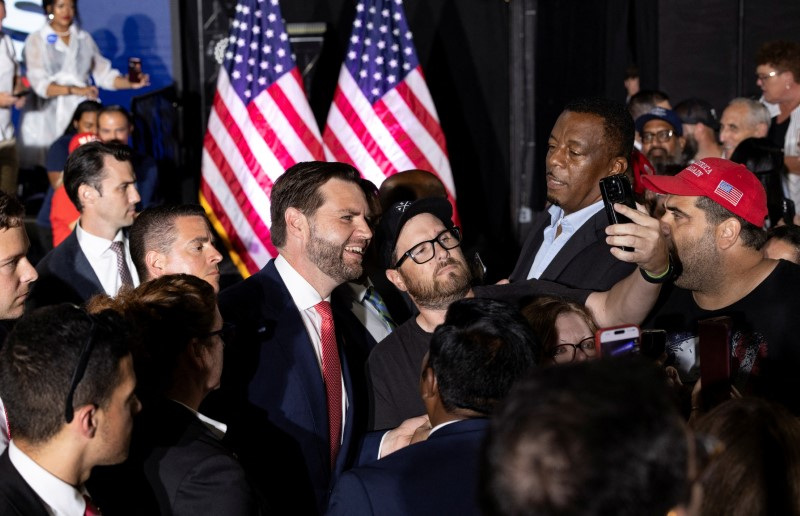Republican VP nominee Vance backs ‘political’ decision-making on Fed policies

By Richard Cowan
WASHINGTON (Reuters) – Republican U.S. vice presidential candidate JD (NASDAQ:) Vance on Sunday said he supports Donald Trump’s call for presidents to have a say in Federal Reserve Board policy-making, including interest-rate moves, saying those should be “political” decisions.
Vance’s remarks during an interview with CNN’s “State of the Union” program came after Trump on Thursday told reporters: “I feel the president should have at least (a) say in there.”
Explaining Trump’s position, Vance said that the former president believes the political leadership in the United States should have more say over the country’s monetary policy.
While the president nominates members of the Federal Reserve Board, past administrations largely have maintained that White House meddling in the Fed’s monetary decisions would inject short-term political pressures that could end up hurting the U.S. economy over the long-run.
That has not stopped presidents in the past, however, from occasionally grumbling about Fed stances.
“I agree with him (Trump). That should fundamentally be a political decision. Agree or disagree, we should have America’s elected leaders having input about the most important decisions that confront our country,” Vance said.
Vance said that it would be “a huge change” to veer away from a long-held stance that the Fed should be an independent policy-making institution on monetary policy.
During last week’s press conference in Florida, Trump boasted: “I think that in my case, I made a lot of money, I was very successful, and I think I have a better instinct than in many cases, people that would be on the Federal Reserve or the chairman.”
Trump did not mention that several times over his business career his enterprises have defaulted on interest payments and filed for bankruptcy.
Democratic presidential nominee Kamala Harris said on Saturday that she strongly disagreed with Trump’s views on the Fed.
“The Fed is an independent entity and as president I would never interfere in the decisions that the Fed makes,” Harris told reporters in Phoenix, Arizona.
In March 2022, the Fed began raising interest rates in an effort to tame rising inflation, as the United States was climbing out of the economic shocks of the COVID-19 pandemic.
Interest rates set by the central bank can have a direct impact on borrowing costs ranging from home mortgages to credit cards.
Wall Street investors have been expecting the Fed to take its first step next month to reverse that course as inflation has been cooling.
As of June of this year, the inflation rate was 2.5% by the Fed’s preferred measure, nearing its 2% target, after hitting 7.1% in June 2022. Other measures of inflation have been running higher but are also showing signs of easing.
The Trump-Vance remarks come on the heels of a “2025 Presidential Transition Project,” a controversial agenda pushed by some conservatives that recommends vast changes throughout the federal government if Trump wins the Nov. 5 presidential election against Harris.

Among its recommendations were: “Appoint a commission to explore the mission of the Federal Reserve, alternatives to the Federal Reserve system, and the nation’s financial regulatory apparatus,” along with other proposals for the Fed.
As Democrats have ramped up their attacks on “Project 2025,” Trump has distanced himself from it.





